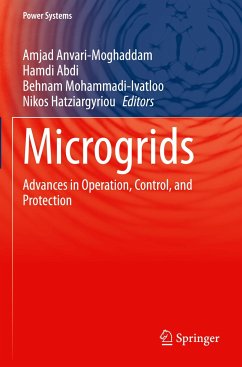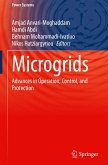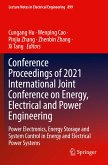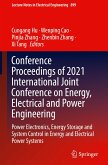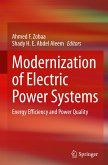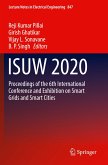Microgrids
Advances in Operation, Control, and Protection
Herausgegeben:Anvari-Moghaddam, Amjad; Abdi, Hamdi; Mohammadi-ivatloo, Behnam; Hatziargyriou, Nikos
Microgrids
Advances in Operation, Control, and Protection
Herausgegeben:Anvari-Moghaddam, Amjad; Abdi, Hamdi; Mohammadi-ivatloo, Behnam; Hatziargyriou, Nikos
- Broschiertes Buch
- Merkliste
- Auf die Merkliste
- Bewerten Bewerten
- Teilen
- Produkt teilen
- Produkterinnerung
- Produkterinnerung
This book provides a comprehensive overview on the latest developments in the control, operation, and protection of microgrids. It provides readers with a solid approach to analyzing and understanding the salient features of modern control and operation management techniques applied to these systems, and presents practical methods with examples and case studies from actual and modeled microgrids. The book also discusses emerging concepts, key drivers and new players in microgrids, and local energy markets while addressing various aspects from day-ahead scheduling to real-time testing of…mehr
Andere Kunden interessierten sich auch für
![Microgrids Microgrids]() Microgrids112,99 €
Microgrids112,99 €![Optimal Operation and Control of Power Systems Using an Algebraic Modelling Language Optimal Operation and Control of Power Systems Using an Algebraic Modelling Language]() Nnamdi NwuluOptimal Operation and Control of Power Systems Using an Algebraic Modelling Language90,99 €
Nnamdi NwuluOptimal Operation and Control of Power Systems Using an Algebraic Modelling Language90,99 €![Conference Proceedings of 2021 International Joint Conference on Energy, Electrical and Power Engineering Conference Proceedings of 2021 International Joint Conference on Energy, Electrical and Power Engineering]() Conference Proceedings of 2021 International Joint Conference on Energy, Electrical and Power Engineering149,99 €
Conference Proceedings of 2021 International Joint Conference on Energy, Electrical and Power Engineering149,99 €![Conference Proceedings of 2021 International Joint Conference on Energy, Electrical and Power Engineering Conference Proceedings of 2021 International Joint Conference on Energy, Electrical and Power Engineering]() Conference Proceedings of 2021 International Joint Conference on Energy, Electrical and Power Engineering149,99 €
Conference Proceedings of 2021 International Joint Conference on Energy, Electrical and Power Engineering149,99 €![Modernization of Electric Power Systems Modernization of Electric Power Systems]() Modernization of Electric Power Systems119,99 €
Modernization of Electric Power Systems119,99 €![Planning and Operation of Multi-Carrier Energy Networks Planning and Operation of Multi-Carrier Energy Networks]() Planning and Operation of Multi-Carrier Energy Networks119,99 €
Planning and Operation of Multi-Carrier Energy Networks119,99 €![ISUW 2020 ISUW 2020]() ISUW 2020116,99 €
ISUW 2020116,99 €-
-
-
This book provides a comprehensive overview on the latest developments in the control, operation, and protection of microgrids. It provides readers with a solid approach to analyzing and understanding the salient features of modern control and operation management techniques applied to these systems, and presents practical methods with examples and case studies from actual and modeled microgrids. The book also discusses emerging concepts, key drivers and new players in microgrids, and local energy markets while addressing various aspects from day-ahead scheduling to real-time testing of microgrids. The book will be a valuable resource for researchers who are focused on control concepts, AC, DC, and AC/DC microgrids, as well as those working in the related areas of energy engineering, operations research and its applications to energy systems.Presents modern operation, control and protection techniques with applications to real world and emulated microgrids;Discusses emerging concepts, key drivers and new players in microgrids and local energy markets;Addresses various aspects from day-ahead scheduling to real-time testing of microgrids.
Produktdetails
- Produktdetails
- Power Systems
- Verlag: Springer / Springer International Publishing / Springer, Berlin
- Artikelnr. des Verlages: 978-3-030-59752-8
- 1st edition 2021
- Seitenzahl: 656
- Erscheinungstermin: 17. März 2022
- Englisch
- Abmessung: 235mm x 155mm x 36mm
- Gewicht: 978g
- ISBN-13: 9783030597528
- ISBN-10: 3030597520
- Artikelnr.: 63453193
- Herstellerkennzeichnung Die Herstellerinformationen sind derzeit nicht verfügbar.
- Power Systems
- Verlag: Springer / Springer International Publishing / Springer, Berlin
- Artikelnr. des Verlages: 978-3-030-59752-8
- 1st edition 2021
- Seitenzahl: 656
- Erscheinungstermin: 17. März 2022
- Englisch
- Abmessung: 235mm x 155mm x 36mm
- Gewicht: 978g
- ISBN-13: 9783030597528
- ISBN-10: 3030597520
- Artikelnr.: 63453193
- Herstellerkennzeichnung Die Herstellerinformationen sind derzeit nicht verfügbar.
¿ Amjad Anvari-Moghaddam, PhD, is an Associate Professor at the Department of Energy Technology, Aalborg University where he is the head of the Integrated Energy Systems Laboratory (IES-Lab). His research interests include planning, control and operation of energy systems, mostly renewable and hybrid power systems with appropriate market mechanisms. He is a Technical Committee Member of IEEE-IES Renewable Energy Systems (RES); IEEE-IES Energy Storage (ESTC), IEEE-IES Resilience and Security for Industrial Applications (ReSia); IEEE Working Group P2004; IEEE-PES Energy Development and Power Generation (ED&PG); IEEE-PES Power System Operation, Planning and Economics (PSOPE) as well as CIGRE WG on Rural Electrification (TOR C6.38) and Distributed Energy Resources Aggregation Platforms for the Provision of Flexibility Services (TOR C6.35). He also serves as the Secretary of the IEEE Working Group on Smart Buildings, Loads and Customer Systems and the Technical Program/Advisory Committee Member of several international conferences. Prof. Anvari-Moghaddam is the Associate Editor of the IEEE TRANSACTIONS ON POWER SYSTEMS, IEEE ACCESS, IEEE OPEN ACCESS JOURNAL OF POWER AND ENERGY, IEEE POWER ENGINEERING LETTERS, IET RENEWABLE POWER GENERATION, and INTERNATIONAL TRANSACTIONS ON ELECTRICAL ENERGY SYSTEMS. He was the recipient of 2020 DUO - India Fellowship Award, DANIDA Research Fellowship grant from the Ministry of Foreign Affairs of Denmark in 2018, IEEE Outstanding Leadership Award 2018 (Halifax, Nova Scotia, Canada), and the 2017 IEEE Outstanding Service Award (Exeter-UK).. Hamdi Abdi, PhD, is an Associate Professor in the Department of Electrical Engineering, Razi University, Kermanshah, Iran. He received the B.Sc. degree from University of Tabriz, Tabriz, Iran, in 1995, and the M.Sc. and Ph.D. degrees from Tarbiat Modares University, Tehran, Iran, in 1999 and 2006, respectively, all in electrical engineering. He is currently in the Department of Electrical Engineering, Razi University, Kermanshah, Iran. His research interests include power system optimization, operation and planning, smart grids, demand response, multi-carrier energy systems, energy hubs, load forecasting, and design of electrical and control systems for industrial plants.. Behnam Mohammadi-Ivatloo, PhD, is a Senior Researcher at Aalborg University, Aalborg, Denmark and Professor at the University of Tabriz, Tabriz, Iran, where he is head of the Smart Energy Systems Lab. Before joining the University of Tabriz, he was a research associate at Institute for Sustainable Energy, Environment and Economy, University of Calgary, Canada. He obtained his MSc and PhD degrees in electrical engineering from Sharif University of Technology, Tehran, Iran. His main areas of interest are renewable energies, micro grid systems, and smart grids. He is included in the 2018 and 2019 Thomson Reuters' list of the top 1% most cited researchers. Nikos Hatziargyriou, PhD, received the Diploma in Electrical and Mechanical Engineering from National Technical University of Athens (NTUA), and the MSC and PhD degrees from the University of Manchester Institute of Science and Technology (UMIST), Manchester, UK. Since 1984 he has been with the Power Division of the Electrical and Computer Engineering Department of NTUA, and since 1995, he is full professor in Power Systems. He is founder of the "SmartRue" research unit of the Energy Systems Laboratory of the National Technical University of Athens. From April 2015 to May 2018 was Chairman and CEO and until November 2019 Chairman of the Board of the Hellenic Distribution Network Operator (HEDNO), the Distribution Utility of Greece. From February 2007 to September 2012, he was Deputy CEO of the Public Power Corporation (PPC) of Greece. He is the Editor-in-Chief of the IEEE Transactions on Power Systems, a member of the Editorial Board of IEEE Transactions on Sustainable Development and the IEEE Power and Energy magazine, and author of the book Microgrids: Architectures and Control. He has co-authored more than 250 journal publications and 600 conference proceedings papers. He is Fellow Member of IEEE, past Chair of the Power System Dynamic Performance Committee, Honorary member of CIGRE, and past Chair of CIGRE SC C6 "Distribution Systems and Distributed Generation". He was chair, currently is vice-chair of the European Technology and Innovation Platform for Smart Networks for Energy Transition (ETIP-SNET) and a member of the Energy Committee of the Athens Academy of Science. He is included in the 2016, 2017 and 2019 Thomson Reuters' list of the top 1% most cited researchers.
Part I. Operation of Microgrids.- Chapter 1. An Introduction to Microgrids, Concepts, Definitions, and Classifications.- Chapter 2. Operation Management of Microgrid Clusters.- Chapter 3. Energy Management Systems for Microgrids.- Chapter 4. Optimal Dispatch and Unit Commitment in Microgrids.- Chapter 5. The Role of Energy Storage Systems in Microgrids Operation.- Chapter 6. Microgrids and Local Energy Markets.- Chapter 7. Economic assessment of microgrids integrated with demand-side management schemes.- Chapter 8. Microgrids Operation: Real-Time Perspectives and Challenges.- Chapter 9. Applications of Heuristic Techniques and Evolutionary Algorithms in Microgrids Optimization Problems.- Part 2. Control of Microgrids.- Chapter 10. Conventional droop methods for microgrids.- Chapter 11. Distributed control approaches for microgrids.- Chapter 12. On Control of Energy Storage Systems in Microgrids.- Chapter 13. Microgrid Stability Definitions, Analysis, and Examples.- Chapter 14. Voltage unbalance compensation in AC microgrids.- Chapter 15. WAM-based Hierarchical Control of Islanded AC Microgrids.- Part III. Protection of Microgrids.- Chapter 16. Fault Ride Through and Fault Current Management for Microgrids.- Chapter 17. Microgrid protection.- Chapter 18. A New Second Central Moment-Based Algorithm for Differential Protection in Micro-grids.- Chapter 19. Microgrids Protection with Conventional and Adaptive protection schemes.- Chapter 20. Fault Identification, Protection Schemes, and Restoration Requirements of Microgrids.- Chapter 21. Real-time testing of Microgrids.
Part I. Operation of Microgrids.- Chapter 1. An Introduction to Microgrids, Concepts, Definitions, and Classifications.- Chapter 2. Operation Management of Microgrid Clusters.- Chapter 3. Energy Management Systems for Microgrids.- Chapter 4. Optimal Dispatch and Unit Commitment in Microgrids.- Chapter 5. The Role of Energy Storage Systems in Microgrids Operation.- Chapter 6. Microgrids and Local Energy Markets.- Chapter 7. Economic assessment of microgrids integrated with demand-side management schemes.- Chapter 8. Microgrids Operation: Real-Time Perspectives and Challenges.- Chapter 9. Applications of Heuristic Techniques and Evolutionary Algorithms in Microgrids Optimization Problems.- Part 2. Control of Microgrids.- Chapter 10. Conventional droop methods for microgrids.- Chapter 11. Distributed control approaches for microgrids.- Chapter 12. On Control of Energy Storage Systems in Microgrids.- Chapter 13. Microgrid Stability Definitions, Analysis, and Examples.- Chapter 14. Voltage unbalance compensation in AC microgrids.- Chapter 15. WAM-based Hierarchical Control of Islanded AC Microgrids.- Part III. Protection of Microgrids.- Chapter 16. Fault Ride Through and Fault Current Management for Microgrids.- Chapter 17. Microgrid protection.- Chapter 18. A New Second Central Moment-Based Algorithm for Differential Protection in Micro-grids.- Chapter 19. Microgrids Protection with Conventional and Adaptive protection schemes.- Chapter 20. Fault Identification, Protection Schemes, and Restoration Requirements of Microgrids.- Chapter 21. Real-time testing of Microgrids.

